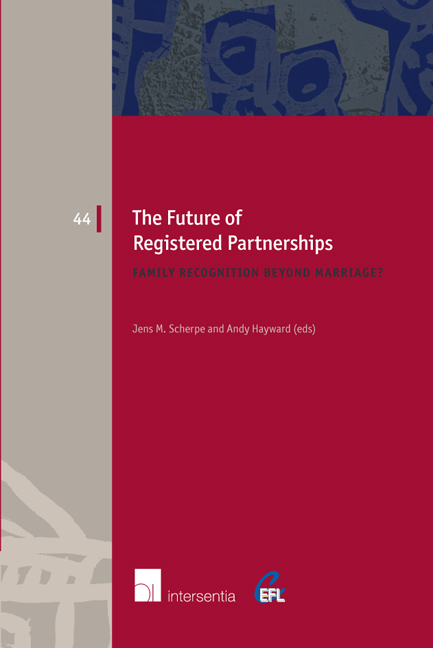Book contents
- Frontmatter
- Foreword
- Preface
- Contents
- List of Contributors
- The Future of Registered Partnerships: An Introduction
- Questionnaire
- Part I Registered Partnerships as a Functional Equivalent to Marriage
- Part II Registered Partnerships as an Alternative to Marriage
- Registered Partnerships in the Netherlands
- Registered Partnerships in France
- Part III Registered Partnerships in a Time of Transition
- Part IV Alternative Models for Registered Partnerships: Beyond Conjugality, Beyond Formality
- Part V Registered Partnerships, Discrimination and Human Rights
- Part VI Comparative Perspective and Conclusions
- Index
- European Family Law Series
Registered Partnerships in France
from Part II - Registered Partnerships as an Alternative to Marriage
Published online by Cambridge University Press: 22 September 2018
- Frontmatter
- Foreword
- Preface
- Contents
- List of Contributors
- The Future of Registered Partnerships: An Introduction
- Questionnaire
- Part I Registered Partnerships as a Functional Equivalent to Marriage
- Part II Registered Partnerships as an Alternative to Marriage
- Registered Partnerships in the Netherlands
- Registered Partnerships in France
- Part III Registered Partnerships in a Time of Transition
- Part IV Alternative Models for Registered Partnerships: Beyond Conjugality, Beyond Formality
- Part V Registered Partnerships, Discrimination and Human Rights
- Part VI Comparative Perspective and Conclusions
- Index
- European Family Law Series
Summary
HISTORY AND BACKGROUND
BASIC STRUCTURES OF THE LAW ON ADULT RELATIONSHIPS
In France adult relationships are governed by three different legal regimes: marriage, registered partnership (pacte civil de solidarite, usually named pacs) and cohabitation.
Marriage is rooted in the Roman law heritage of the French legal system and is regulated by the Civil Code, including the legal effects of the union and its dissolution. When the couple agree to be married, they not only agree to marry one another but also that their relationship will be governed by a fundamental and intensely regulated civil institution. The regime primaire imperatif is the mandatory default structure for civil marriage. Although the couples'will is taken into account to some extent in other areas, it cannot amend these essential foundations of marriage.
The pacs is the second form of legalised union in France. As opposed to marriage, the pacs is a tailor-made contract between two persons, over 18, to organise their life in common. The couple will settle the future organisation of their life in common, regarding property, goods and belongings, in a written contract which must be registered in order to be binding. Whereas originally the contract was not subject to any mandatory legal rules, after the recent reforms of pacs a mandatory pre-established pacs structure is emerging, although not one that is fully comparable with the one that governs marriage.
Cohabitation is not regulated comprehensively in the French legal system. In 1999, along with the introduction of the pacs into French law, Parliament adopted a legal definition of cohabitation, which included same-sex couples. Monogamy, as well as the stable and continuous character of the relationship, must be established in order to prove cohabitation. Specific social and welfare rights are granted to cohabitants, yet there are no statutory provisions creating any legal duties and rights between cohabitants themselves. Nevertheless, case law has come to regulate the situation of cohabitants, especially when the relationship breaks down.
MOTIVES FOR INTRODUCTION OF REGISTERED PARTNERSHIP
The main motivation for the introduction of the pacs was the complete absence of legal recognition of same-sex couples in the French legal system.
- Type
- Chapter
- Information
- The Future of Registered PartnershipsFamily Recognition Beyond Marriage?, pp. 153 - 184Publisher: IntersentiaPrint publication year: 2017
- 1
- Cited by

